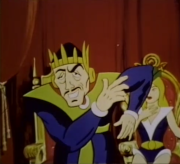|
A_Bluenoser posted:It is necessary to be careful with terms like "wizard" as well. Etymologically in English it simply refers to a "wise man" and is pretty much equivalent to the term "sage" until at least the 16th century if I recall properly. That means that talking about "wizard magic" as a category before the 16th century is probably misleading because it is back-projecting a later concept on to an earlier time. Sir Terry Pratchett famously remarked that 'wizard' is derived from the archaic word "Wys-ars", meaning one who, at bottom, is very wise. Edit: I forgot to say this earlier, but I don't believe anyone practicing any kind of ceremonial magic in the Western world calls themselves a wizard, or at the very least, I have never seen it. Mad Hamish fucked around with this message at 19:03 on Nov 18, 2022 |
|
|
|

|
| # ? May 25, 2024 11:26 |
|
Yeah, last time I researched some of it, I got the impression that a lot of our modern conception of "magic" is more the product of later people making their own commentary rather than genuine folklore and historic beliefs. There may have been plenty of beliefs about various supernatural phenomena in the past, but they weren't really distinct and separate from the beliefs about natural phenomena. I think one of the ways that Christianity dealt with other religions was to decide that other gods and mythological creatures may have been real, they were just demons, which would mean the people who reportedly consorted with them and their forces would be more suspect. And it certainly wouldn't help their case if those practitioners threatened to have the power to do bad things as well, as you might do if you're some local big fish trying to show off your spooky might. And there's a lot of complicated history with Christianity sometimes accepting and integrating local beliefs and other times rejecting claims of supernatural power as fake and invalidating it rather than giving it the legitimacy of being acknowledged as a threat. The anglosphere pop culture idea is mainly focused on the witch hunt hysterias that were comparatively recent and often disapproved by higher church authorities if there were any.
|
|
|
|
Mad Hamish posted:Anthropologically speaking the witch is someone who works magic in a fashion that isn't socially-sanctioned, and often uses their magical powers for malevolent means. The stereotype here is of black and midnight hags making bargains with the Devil and fulfilling his instructions to wither your livestock, sour your sheep's milk, and make your shirts itchy. This. In my reckoning any sufficiently powerful supernatural being is indistinguishable from a god. I was being a bit cheeky with the wording as I'm wont to do as I am but an instrument of the Devil himself. FreudianSlippers fucked around with this message at 20:25 on Nov 18, 2022 |
|
|
SlothfulCobra posted:Yeah, last time I researched some of it, I got the impression that a lot of our modern conception of "magic" is more the product of later people making their own commentary rather than genuine folklore and historic beliefs. There may have been plenty of beliefs about various supernatural phenomena in the past, but they weren't really distinct and separate from the beliefs about natural phenomena. It's hard to say what "Christianity did," since there were numerous routes which led to cultural synchronization with many of the elements of non-Christian culture. This could include casting positive figures as saints in some form, or recouching various trivial practices. I imagine a lot of the early period looked very syncretic, like how Haitian vodou and related beliefs have lots of obvious non-Christian elements but pay homage to an oversight point involving the Christian conception of the universe. Most of the recent stuff is back-casting from stuff in the mid/late 19th century, which was revived/reinterpreted by bored aristocrats, very broadly speaking.
|
|
|
|
|
Nessus posted:I took a course in medieval witchcraft and wizardry (not a practical) and I think that this is broadly accurate. The big idea of the course was that many of the ideas underlying "natural magic" were wrong, but weren't unreasonable. People who were trying to do astrology magic to hex the duke to favor them in a lawsuit had reason and logic to believe it would help. As far as i know, medieval witchcraft wasn't really a thing, was it? People could be and were prosecuted for using magic to do evil (There's a case during the reign of Edward ii where someone is put to death for trying to curse Hugh Despenser), but the whole idea of witchcraft....of selling one's soul to the devil in exchange for the power to do evil, is an early modern thing, as far as i know. The Catholic Church in the Middle Ages considered people who believed that either heretics or just mentally ill/the victim of delusions.
|
|
|
|
Mad Hamish posted:Sir Terry Pratchett famously remarked that 'wizard' is derived from the archaic word "Wys-ars", meaning one who, at bottom, is very wise. I have, but on tumblr.
|
|
|
|
Epicurius posted:As far as i know, medieval witchcraft wasn't really a thing, was it? People could be and were prosecuted for using magic to do evil (There's a case during the reign of Edward ii where someone is put to death for trying to curse Hugh Despenser), but the whole idea of witchcraft....of selling one's soul to the devil in exchange for the power to do evil, is an early modern thing, as far as i know. The Catholic Church in the Middle Ages considered people who believed that either heretics or just mentally ill/the victim of delusions. This is a bit of terminology confusion. "Witchcraft" is, usually, a pretty broad understanding of unsanctioned, typically malicious magic, and it's generally accepted to use "witchcraft" to refer to any of a million different accusations from ancient Sumeria to ones made by people mad about Harry Potter. There are specific elements of the type of witchcraft accusations that lead to the early modern witch hunts like black masses and such that do not make sense to talk about in medieval context, but "witchcraft" is an offense to Christian law since before it was a European religion. It's in Exodus.
|
|
|
|
Epicurius posted:As far as i know, medieval witchcraft wasn't really a thing, was it? People could be and were prosecuted for using magic to do evil (There's a case during the reign of Edward ii where someone is put to death for trying to curse Hugh Despenser), but the whole idea of witchcraft....of selling one's soul to the devil in exchange for the power to do evil, is an early modern thing, as far as i know. The Catholic Church in the Middle Ages considered people who believed that either heretics or just mentally ill/the victim of delusions. Aquinas argued in favor of the validity (practical not moral) of sorcery iirc. In the early Middle Ages church and state could be much more skeptical of it. Charlemagne’s capitulary against the Saxons says that those who believe in witches are heathens deceived by the devil.
|
|
|
Mad Hamish posted:
https://www.greyschool.net/ I call particular attention to the faculty page. Hieronymous Alloy fucked around with this message at 22:04 on Nov 18, 2022 |
|
|
|
|
Hieronymous Alloy posted:https://www.greyschool.net/ i thought that the place was legit until i saw a druid/wizard combo it's probably one of the worst class combos possible, avoid that site, they don't know poo poo
|
|
|
|
SlothfulCobra posted:I think one of the ways that Christianity dealt with other religions was to decide that other gods and mythological creatures may have been real, they were just demons, which would mean the people who reportedly consorted with them and their forces would be more suspect. And it certainly wouldn't help their case if those practitioners threatened to have the power to do bad things as well, as you might do if you're some local big fish trying to show off your spooky might. It’s not quite this simple. Other gods start out as a threat to monotheism. And it’s pre-Christianity that this starts: “This made it possible for the Greek philosophers (who had introduced the same radical abstraction with respect to God), and the Jewish universalists ,with respect to God, to unite. It was especially Philo of Alexandria who carried through this union, in the idea of God. But if God has become abstract, then it is not sufficient to hypostasize some of His qualities, such as heaven, height, glory: more is needed. Mediating beings appear between God and man who become more and more important for practical piety. There are three main concepts of this mediating character. First, the angels: they are deteriorized gods and godesses from the surrounding paganism. In the period of the prophets, when the fight with polytheism still was going on, they couldn't play any role. But when the danger of polytheism was completely overcome as it was in later Judaism then the angels could reappear. without too great danger of a relapse into polytheism. But even so, the New Testament is aware of this danger and again and again warns against the cult of the angels. These are the first figures which mediate.” -History of Christian Thought.
|
|
|
Epicurius posted:As far as i know, medieval witchcraft wasn't really a thing, was it? People could be and were prosecuted for using magic to do evil (There's a case during the reign of Edward ii where someone is put to death for trying to curse Hugh Despenser), but the whole idea of witchcraft....of selling one's soul to the devil in exchange for the power to do evil, is an early modern thing, as far as i know. The Catholic Church in the Middle Ages considered people who believed that either heretics or just mentally ill/the victim of delusions. This was actually at a Catholic school: I'm not sure what the official statement on witchcraft is but it seemed to be like demons: "We admit that the phenomenon is real but that it is vanishingly rare, and that many, many things that were claimed to be it, are not." We did have a discussion about how many exorcisms there had been, officially sanctioned, in the twentieth century and I think it was something like "three."
|
|
|
|
Mad Hamish posted:
Well there was that one guy in Chicago
|
|
|
|
|
Mad Hamish posted:Sir Terry Pratchett famously remarked that 'wizard' is derived from the archaic word "Wys-ars", meaning one who, at bottom, is very wise. 
|
|
|
|
Key thing to remember is for most of human history, religion and magic are pretty much the same thing. See how 'witches' are put into an explicitly Christian framework. And Merlin being the son of the Devil turned good because he was baptized. Priest, magic man and wise man all basically mean the same thing going back. Look also at miracles of Christian saints and Rabbinical arguments being basically wizard duels. The idea of a 'secular' magic user is relatively new, though it's a bit of a revival of some Greek ideas of magic. You can literally trace it to comic books and Dungeons and Dragons using wizards as reskinned siege weapons.
|
|
|
|
This discussion brought into my mind that how often in these cases the witches and 'making deals with the devil' type people were actual witches? Actual in a sense that they actually believed they were doing magic and worshipping satan and whatnot. I know that the popular view is that witch trials and such were targeted against people because of political reasons or that the people just didn't like that strange neighbour and started accusing her because their cow had died and it made them angry. But it would make sense that there would be cases where power hungry people would try making deals with the devil if their belief framework was based on reality of it being possible, no? Like I read about this French fortune teller Catherine Monvoisin (https://en.wikipedia.org/wiki/La_Voisin), and she's purported to having held black masses and selling black magicks. Of course it is impossible to tell if that really happened, were the claims just political manouvering to get rid of the king's mistress or was Catherine doing a grift but the latter case would imply that there were true believers wanting to deal with the devil that could be grifted in the first place...
|
|
|
|
Ghost Leviathan posted:Key thing to remember is for most of human history, religion and magic are pretty much the same thing. See how 'witches' are put into an explicitly Christian framework. And Merlin being the son of the Devil turned good because he was baptized. Priest, magic man and wise man all basically mean the same thing going back. Look also at miracles of Christian saints and Rabbinical arguments being basically wizard duels. I mean, Prospero is a pretty classic-rear end nonreligious wizard
|
|
|
|
Prospero is interesting because you can tell there’s this tension about whether it is right for him to be a magician. Hes opposed to this extremely contemporarily conceived devil-loving witch (who never shows up onstage), so you can tell right away he’s not the nasty kind of wizard. But as it turns out he was also a duke at one time and part of (Christian) society, but lost it all due to spending his time studying magic instead of ruling. the story comes to a good end because he renounces magic and accepts a return to that society. He also ends by asking the audience to pray for him and forgive his failings—he means the play is over and it’s time to clap, but the same religious framing applying equally to real-life acting and fictional magic is revealing.
|
|
|
|
Glah posted:This discussion brought into my mind that how often in these cases the witches and 'making deals with the devil' type people were actual witches? Actual in a sense that they actually believed they were doing magic and worshipping satan and whatnot. There are people who believe that now in our rather more secular age. I can certainly believe it was a thing then, too. Edit: if I remember correctly, and I may not, 'witches' and suchlike in the Old Testament are, in fact, basically worshippers of gods other than Jewish one who invoke those gods' powers. So basically, people praying to someone the authors think they shouldn't rather than the entity they think they should.
|
|
|
|
Ghost Leviathan posted:Key thing to remember is for most of human history, religion and magic are pretty much the same thing. See how 'witches' are put into an explicitly Christian framework. And Merlin being the son of the Devil turned good because he was baptized. Priest, magic man and wise man all basically mean the same thing going back. Look also at miracles of Christian saints and Rabbinical arguments being basically wizard duels. You are utterly incorrect though. The Christian cosmology is basically neoplatonism, explicitly so. The Jewish thought that merges with Greek thought is also rather explicitly not how you are characterizing it.
|
|
|
|
Ghost Leviathan posted:Key thing to remember is for most of human history, religion and magic are pretty much the same thing. See how 'witches' are put into an explicitly Christian framework. And Merlin being the son of the Devil turned good because he was baptized. Priest, magic man and wise man all basically mean the same thing going back. Look also at miracles of Christian saints and Rabbinical arguments being basically wizard duels. So one of my favorite small facts from history is that trial by water for witchcraft? That dates back to Sumeria. It's been on the law books dating back to, literally, 2000BCE. Its on the Code of Ur-Nammu, from Ur, making it amusingly an Ur Law. It's loving old. Also stands as a way of pointing out that the division between "this type of magic is fine, this type of magic is not" is much older than Christianity. It is, in fact, as old as we have laws.
|
|
|
|
Well I certainly didn't intend to open up this can of worms! Sorry, folks!Glah posted:This discussion brought into my mind that how often in these cases the witches and 'making deals with the devil' type people were actual witches? Actual in a sense that they actually believed they were doing magic and worshipping satan and whatnot. I know that the popular view is that witch trials and such were targeted against people because of political reasons or that the people just didn't like that strange neighbour and started accusing her because their cow had died and it made them angry. But it would make sense that there would be cases where power hungry people would try making deals with the devil if their belief framework was based on reality of it being possible, no? It is very obvious that no-one was travelling to the Witches' Sabbath and doing all the things we see discussed in books on the subject - the osculum infame, the renunciation of baptism and being re-baptized by the Devil, receiving the witch-mark, that sort of thing. These ideas spread around because people read a book or tract on the subject and got scared. The exact same thing happened in the 1980s-1990s with the satanic ritual abuse hysteria and it spread in the exact same way. Montague Summers' preface to his translation of the Malleus Maleficarum spends a lot of time drawing connections to the European witch hysteria and the Red Scare, but Montague Summers was a nutjob and he equated Communism to Satanism. He wasn't alone in this, it was the style at the time. One of the interesting things about this is that the idea of evil witches and their deeds really took off once literacy became more common, because people would print pamphlets with all the lurid details of what happened over in Shelbyville. People two towns over would read them and either get scared that there were witches in their town too, or notice that people passed the hat around to support the poor little bewitched girl and think "Hey, I could pretend to be bewitched" and then the idea would spread. In 1620 in England a boy living in Bilson was bewitched and passed black urine, and it was eventually discovered that he had learned this trick by reading about it in a broadsheet about a different bewitchment. I've read a lot of trial records and books written by and for demonologists from the early modern period and off the top of my head I can think of one (1) case where the accused may, may have been practicing some form of folk magic, which was the Pendle Witches. A lot of modern-day pagan witches, especially those who focus more on 'traditional witchcraft' (as opposed to Wicca, the two are not the same) make a lot of sausage out of a very small amount of pig with the Isobel Gowdie case, but in my opinion Gowdie was off her loving rocker. I can comfortably say that if anyone caught up in the European witch hysteria was practicing folk magic of any sort it would have been a rarity. La Voisin is a weird outlier in witchcraft lore in that it really set the trend for what a Black Mass would look like, but the activities she was accused of doing were not really related to the sort of thing accused witches were supposed to have gotten up to.
|
|
|
|
In Iceland at least some of the accused had actual physical evidence presented against them. Due to how firmly based in physical sigils/staves Icelandic magic is. Usually involving certain signs carved into certain materials and coated with very specific types of blood. So many suspects were caught red handed with skins or wooden tablets carved with "strange characters" or in some rare cases actual full-fledged grimoires. Black Mass and fantastical stuff like that wasn't really a thing. I also vaguely remember one case in the annals circa the late 1600s about a man already condemned to death for blasphemy and heresy* who had human skull fragments in his shoes carved with runes and symbols guaranteeing him to rise from the dead. These were of course removed and his body decapitated and burned to fully prevent return as the Icelandic ghost in that time was the actual physical corpse of the dead rather than a spirit as ghosts are post the spiritist movement. *Any deviation from Lutheranism was punishable by death until religious freedom became law in the 1870s though this wasn't actually enforced after the dark and violent days of Lutheran Orthodoxy in the 17th century.
|
|
|
|
I'm gonna be nitpicky and say that it's more complicated than religion and magic is the same thing because it's often a cosmology thing and while sometimes it does play into religion I would argue that in a lot of cases it doesnt. This is also heavily dependent on how you define magic. Telsa Cola fucked around with this message at 22:58 on Nov 19, 2022 |
|
|
Tulip posted:So one of my favorite small facts from history is that trial by water for witchcraft? That dates back to Sumeria. It's been on the law books dating back to, literally, 2000BCE. Its on the Code of Ur-Nammu, from Ur, making it amusingly an Ur Law. It's loving old. It honestly makes sense, because while some sorcery and witchcraft was probably always bullshit, there were many subtle things, or things that got lucky breaks, or which basically tracked natural phenomena well enough to have predictive powers, and you would at least want to try to regulate those.
|
|
|
|
|
Nessus posted:Yeah this came up a lot in the course I took, that some forms of magic were just fine (arguably, when you pray to God to help you win that stock car race, you are performing 'white' magic), other forms were basically just crudely understood natural science (herbs and so forth, at least when used to ease the King's gout), and others, well. Yeah I mean we've talked about how people used magic to protect themselves from bullets and weapons, and it worked because when they were killed the killers had to use weapons dipped in holy water or shoot them with their own buttons to get past their protection spells.
|
|
|
|
Grand Fromage posted:Korea's higher on the nerd quotient but never qualified for empire status. Finland might have something to say about that.
|
|
|
|
Here's a random question I've been wondering about for a while (mostly due to having to plan an upcoming trip to Germany). How did leisure travel work in the ancient Roman world? I've read somewhere that there was a surprising amount of tourism, especially by the rich, but did they have, like, private travel agents or local administration set up to facilitate travelers or did you just show up with cash and hire some random people to show you around? If I'm some random rich Roman who shows up in Alexandria and wants to see the sights, how would I even go about finding a guide? (I guess I'd tell my slave to work it out but how would he or she do that?) Was it exclusively the rich who vacationed or would working people also travel? Anyways, if there are any good articles or books on ancient travel you'd recommend I'd be much obliged, thanks.
|
|
|
|
FreudianSlippers posted:This. In my reckoning any sufficiently powerful supernatural being is indistinguishable from a god. how are you doing on the sales targets
|
|
|
|
I seek a recommendation for a good book on the history of Persia - either a broad chronology of the region, or something deeper and more focused. Just so long as it's good for a lay history buff.
|
|
|
|
MuffiTuffiWuffi posted:Here's a random question I've been wondering about for a while (mostly due to having to plan an upcoming trip to Germany). How did leisure travel work in the ancient Roman world? I've read somewhere that there was a surprising amount of tourism, especially by the rich, but did they have, like, private travel agents or local administration set up to facilitate travelers or did you just show up with cash and hire some random people to show you around? If I'm some random rich Roman who shows up in Alexandria and wants to see the sights, how would I even go about finding a guide? (I guess I'd tell my slave to work it out but how would he or she do that?) Was it exclusively the rich who vacationed or would working people also travel? I haven't read it myself, but Ibn Battuta's The Rihla might interest you. Dude leaves Morrocco to go on the hajj in the early 1300's at age 21, doesn't return for 24 years after travelling (allegedly) a large chunk of the known world. Not ancient ancient, but probably still somewhat relevant.
|
|
|
|
Bongo Bill posted:I seek a recommendation for a good book on the history of Persia - either a broad chronology of the region, or something deeper and more focused. Just so long as it's good for a lay history buff. May I recommend Herodotus' The Histories  For a non-Herodotus recommendation, I recently read Persians: The Age of Great Kings by Lloyd Llewellyn-Jones and thought it was pretty good, and it draws from a lot of sources that aren't the Father of History. Apparently the past couple decades have seen a lot of advancement in the field of ancient Persian studies.
|
|
|
MuffiTuffiWuffi posted:Here's a random question I've been wondering about for a while (mostly due to having to plan an upcoming trip to Germany). How did leisure travel work in the ancient Roman world? I've read somewhere that there was a surprising amount of tourism, especially by the rich, but did they have, like, private travel agents or local administration set up to facilitate travelers or did you just show up with cash and hire some random people to show you around? If I'm some random rich Roman who shows up in Alexandria and wants to see the sights, how would I even go about finding a guide? (I guess I'd tell my slave to work it out but how would he or she do that?) Was it exclusively the rich who vacationed or would working people also travel? Somewaht related: I love that even in ancient Rome they had lovely tourist souvenirs like 'I went to Rome and all I got you was this stylus".
|
|
|
|
|
Alhazred posted:Somewaht related: I love that even in ancient Rome they had lovely tourist souvenirs like 'I went to Rome and all I got you was this stylus". Was it engraved on the stylus?
|
|
|
|
Fuschia tude posted:Was it engraved on the stylus? yeah  https://arstechnica.com/science/2019/07/a-2000-year-old-stylus-makes-a-point-about-ancient-roman-humor/
|
|
|
|
Alhazred posted:Somewaht related: I love that even in ancient Rome they had lovely tourist souvenirs like 'I went to Rome and all I got you was this stylus". I like the little gladiator action figures they sold at arenas.
|
|
|
|
 These?
|
|
|
|
Fond memories of Fistful of Aliens.Grand Fromage posted:I like the little gladiator action figures they sold at arenas. They were gonna have these in Gladiator but it was seen as too unrealistic.
|
|
|
|
This may be a bit of a tricky question but does anyone have a recommendation for a book about the voyage of Magellan that would be suitable for a younger reader? I have a friend with a 9-year-old kid who reads well ahead of his grade level, and he wants a book on Magellan. I'm sure he can handle something aimed at, say, the teen age range but I don't think he's ready for a full tome of text yet. Gotta support the budding history
|
|
|
|

|
| # ? May 25, 2024 11:26 |
|
Elissimpark posted:I haven't read it myself, but Ibn Battuta's The Rihla might interest you. Huh, thanks for pointing that out. ChubbyChecker posted:yeah Some more fun stuff from the article sourced in that article: https://scienceinpoland.pap.pl/en/news/news,414643,in-a-pharaoh-tomb-archaeologist-examines-the-inscriptions--of-ancient-tourists.html posted:"I visited and I did not like anything except the sarcophagus!"; "I admired!" "I can not read the hieroglyphs!" - these are some of the inscriptions read by the Polish scientists working inside Egypt\'s pharaoh Ramesses VI in the Valley of the Kings.
|
|
|

















































